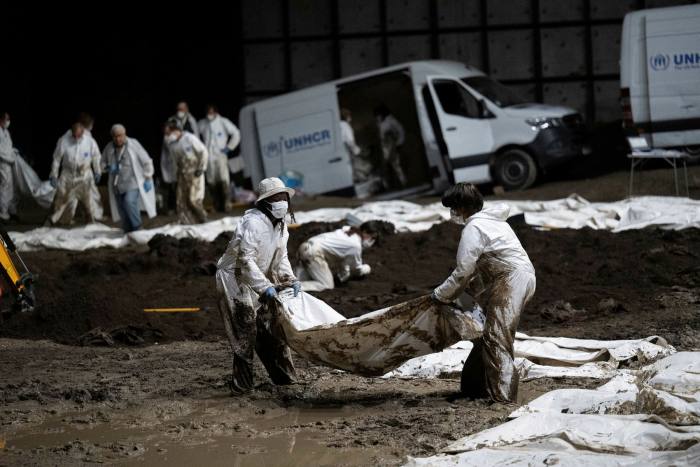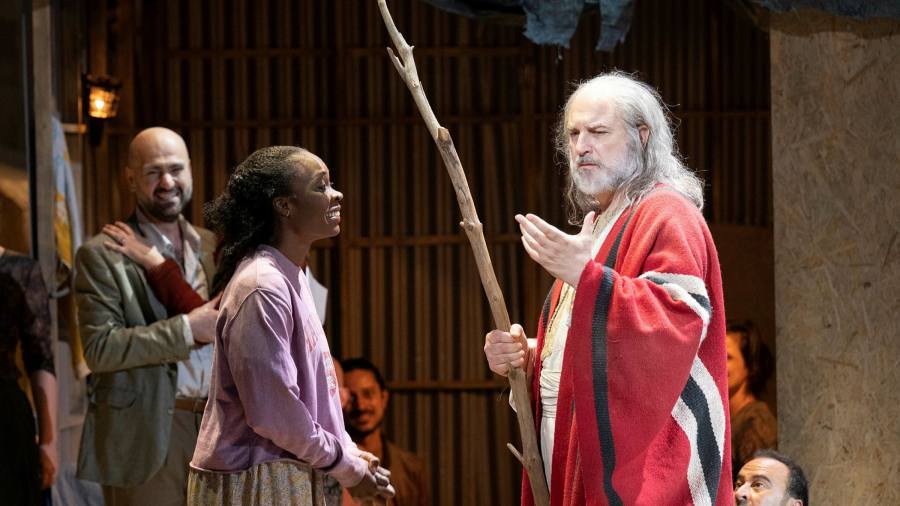It read like a staging of the day’s political events. Deranged with power, an entire government — leaders, aides and backbenchers — hurls itself into the sea and drowns. Suits, ties and high heels swirl in the currents. Schadenfreude being the order of the day, it was hard to stifle a giggle.
Of course, this was the Egyptian army under Pharaoh, not the Johnson government, but Tobias Krazer’s new staging of Rossini’s Moses and Pharaoh for the Aix-en-Provence Festival is so up-to-the-minute, so clever and so relevant that it’s all too easy to see current events in the 1827 opera seria.
The story itself — a refugee population in exile, ruled over by a religious fanatic, locked in bitter conflict with a despotic regime — is all too readily updatable. Kratzer uses the stage of the Théâtre de l’Archevêché to maximum effect, with Rainer Sellmaier’s set evolving from refugee camp and government headquarters to a beachfront for the denouement.
Moses is costumed like a biblical prophet from a 1960s movie, while everyone else is in modern dress; we see from the start that he is a rigid and old-fashioned cult leader, exasperating his supporters with his undiplomatic outbursts. There’s one problem: he really does have a direct line to God and can strike people blind, order a cyber attack or call up plagues at will. His own people are afraid of him, but they would also die for him.
Pharaoh, in a well-tailored suit, is Assad or Putin or any other contemporary dictator, mistrustful of all, consumed by ambition and rage. Kratzer and his team have turned over every line of the libretto again and again, and the level of insight is boggling. These are people who might not mean what they say, or might not say what they think, but we see all the complex relationships exposed with merciless clarity. It is a knuckle-whitening ride, every moment spellbinding; this is classic Regietheater, as good as it gets.
Michele Mariotti is clearly on board with all of Kratzer’s ideas, conducting with passion, a strong sense of architecture and superb attention to detail. The cast is excellent, from Michele Pertusi’s stentorian Moses and Mert Süngü’s agile, capable Eliézer to Jeanine De Bique’s sometimes brittle but strong Anaï and Vasilisa Berzhanskaya’s heart-stoppingly beautiful Sinaïde. Pene Pati’s impetuous, self-absorbed Aménophis is a tour-de-force. The choir and orchestra of the Opéra de Lyon are on top form. If only opera could always be this much fun. ★★★★★

By contrast, Romeo Castellucci’s Resurrection, a staging of Mahler’s second symphony, is a gut-wrenchingly sober affair. It plays near Marseille in an abandoned handball stadium, a gigantic hulk of misconceived real estate that the Aix Festival is helping to rehabilitate.
The audience crams into narrow rows of steeply raked seating, facing a raised platform covered in wet sand and earth. The choir, youth choir and Orchestre de Paris are in a cavernous pit below the stage. Outside, the light is fading; suddenly, a white horse gallops through the rear doors and holds the stage, exploring the mounds of sand, gazing with curiosity at the audience. Its trainer appears, gathers the reins and then stumbles across something horrific, half-buried in the sand. Within minutes a forensic team is on the scene, digging a rotting body from the earth. More team members and more bodies follow.
Castellucci uses Mahler’s music to tell the story of the discovery and disinterral of a mass grave. As the bitter, dark movements unfold, with their moments of tenderness and outbursts of explosive rage, a small army of white-clad workers dig up fourscore decayed corpses of men, women and children, lay them out on body bags, catalogue them, zip them up and load them into waiting UNHCR vans. All this is precisely choreographed to fill almost the entire duration of Mahler’s symphony. It is utterly engrossing for a good quarter-hour, but becomes numbing as the music rolls on, reducing the expressive nuances in Mahler’s sprawling score to the soundtrack for a genocide documentary.
Tension rises as, first, solo singers (the meltingly lovely Golda Schultz and Marianne Crebassa) and then the double choir sing of reassurance and resurrection. The vans with the bodies leave; the workers leave. On the empty stage, rain falls. That is all. Castelluci has given us the most senseless kind of death there is. It could be Bucha or Mariupol today, or Syria or Sarajevo or Rwanda or far too many other places, all of them near and recent.
Esa-Pekka Salonen tailors a version of Mahler to the circumstances, which are light-years away from the comfort of a concert hall. His orchestra is, of necessity, amplified — expensively but not always well — and he keeps the pace brisk, the tone raw and the mood between sardonic and shattering.
So we have plenty of rage against the injustice of death. What we do not get is any kind of resurrection. Fair enough. Perhaps the point is the bringing to light of past wrongs, the small rituals that acknowledge a life lived. The closest Castelluci lets us come to hope is the compassion the gravediggers show to one another. Perhaps, in the end, that is the best we can hope for. ★★★★☆
Pierre Audi’s 2022 festival is ambitious, complex and challenging, often taking the audience out of its comfort zone. Andrea Breth’s gloomy, fragmented Salome releases itself from narrative altogether, much of it playing out in the dark conceptual spaces of the unconscious mind. Elsa Dreisig is compelling and childlike in Strauss’s title role, much helped by Raimund Orfeo Voigt’s singer-friendly sets, shifting, boxlike rooms that double as acoustic shells; John Daszak is a magnificently overwrought Herodes, Angela Denoke a fraught, chilly Herodias, Gábor Bretz has true gravitas as Jochanaan. ★★★★☆
The idea of handing Mozart’s Idomeneo over to Japanese director Satoshi Miyagi was a high-risk one — Miyagi had no previous operatic experience — and his consummately static theatrical style recalls nothing more than an Edward Gorey cartoon of an opera: clammily old-fashioned, a bit rickety, essentially dreary, but with a whiff of something deeply perverse. Raphaël Pichon and his Pygmalion orchestra played as if their lives depended on it, with a solid cast trying to supply all the emotion that was missing from Miyagi’s chilly staging. ★★☆☆☆
The boos and heckling that greeted Miyagi’s team at curtain calls were easier to understand than those at the end of Moses and Pharaoh or Salome, but at least it is reassuring to see that Aix is willing to ruffle a few feathers.
Festival runs to July 23, festival-aix.com
Stay connected with us on social media platform for instant update click here to join our Twitter, & Facebook
We are now on Telegram. Click here to join our channel (@TechiUpdate) and stay updated with the latest Technology headlines.
For all the latest Music News Click Here

